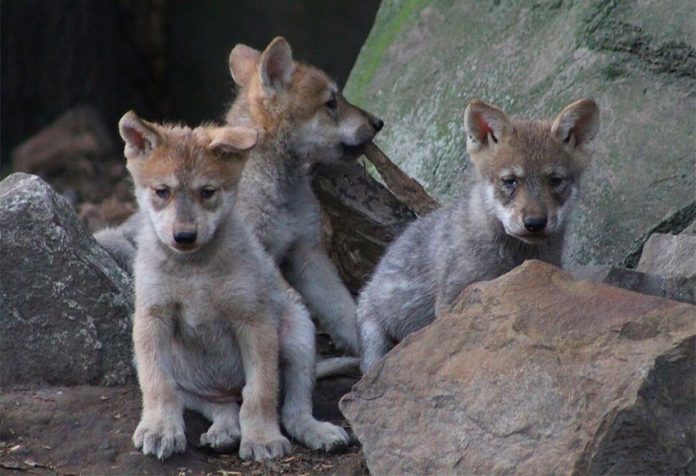The birth of five gray wolf pups at Mexico City’s Chapultepec Zoo in early April marked another step in the efforts to reintroduce the endangered species back into the wild.
The three males and two females are part of a four-decade, bi-national breeding program between the United States and Mexico.
The endangered species has been limited to captivity for decades, and breeding for genetic diversity is essential for them to regain their independence.
The Mexican gray wolf is North America’s rarest subspecies of gray wolf. It was listed as endangered in 1976 after being hunted, trapped and poisoned to the brink of extinction. From the 1960s to the 1980s, seven gray wolves — believed to be the last of their kind — were captured and the captive breeding program began.
Wolves started being released back into the wild in the late 1990s. The population has nearly doubled over the last five years, with the latest annual census finding about 186 Mexican wolves in the wild in New Mexico and Arizona.
However, in northern Mexico, the other part of the wolves’ historic range, reintroduction initially stumbled. An effort to reintroduce them to the wild in Sonora in 2011 ended in tragedy when all five wolves were poisoned. Another release was carried out in 2012 in Chihuahua, and those wolves now number around 40, most born in the wild.
In fact, their classification as “endangered” is a sign of progress: two years ago the species’ status was promoted from “probably extinct in the wild” to “endangered” due to the success of the breeding program. The program has brought the species’ population to around 540, of which 323 live in zoos.
Back at Chapultepec Zoo, Rhi, the father of the pups, signals them to the arrival of breakfast, which takes the form of chicken and quail meat.
Zookeeper Jorge Gutiérrez, 58, is the man who feeds them. He has cared for Rhi since the wolf was born and has seen him form a pack with mother Seje. He watches as the five wolf pups stumble out of their den to eat. “It’s marvelous. What I am experiencing is something unique,” he said.
Fernando Gual, a veterinarian who serves as director of Mexico City’s zoos, said the Chapultepec Zoo also has a sperm and egg bank that provides backup for genetic material, from which Rhi was born, but that females like Seje are the best possible recourse. “This is our jewel … Every litter of pups is hope for the life of this species,” he said.
With reports from AP and The San Diego Union-Tribune
